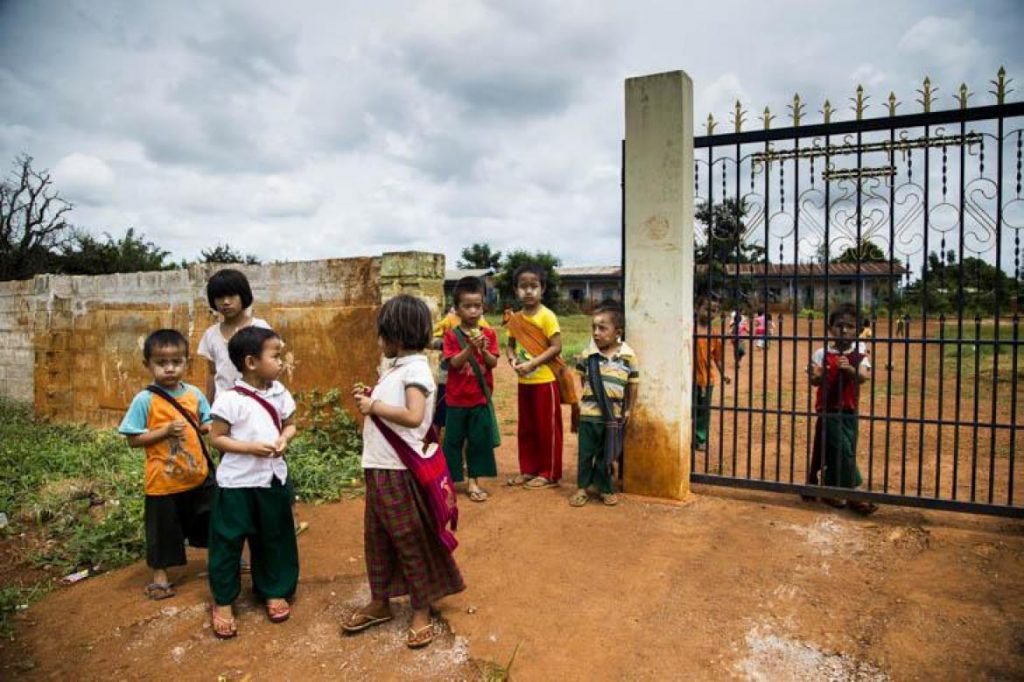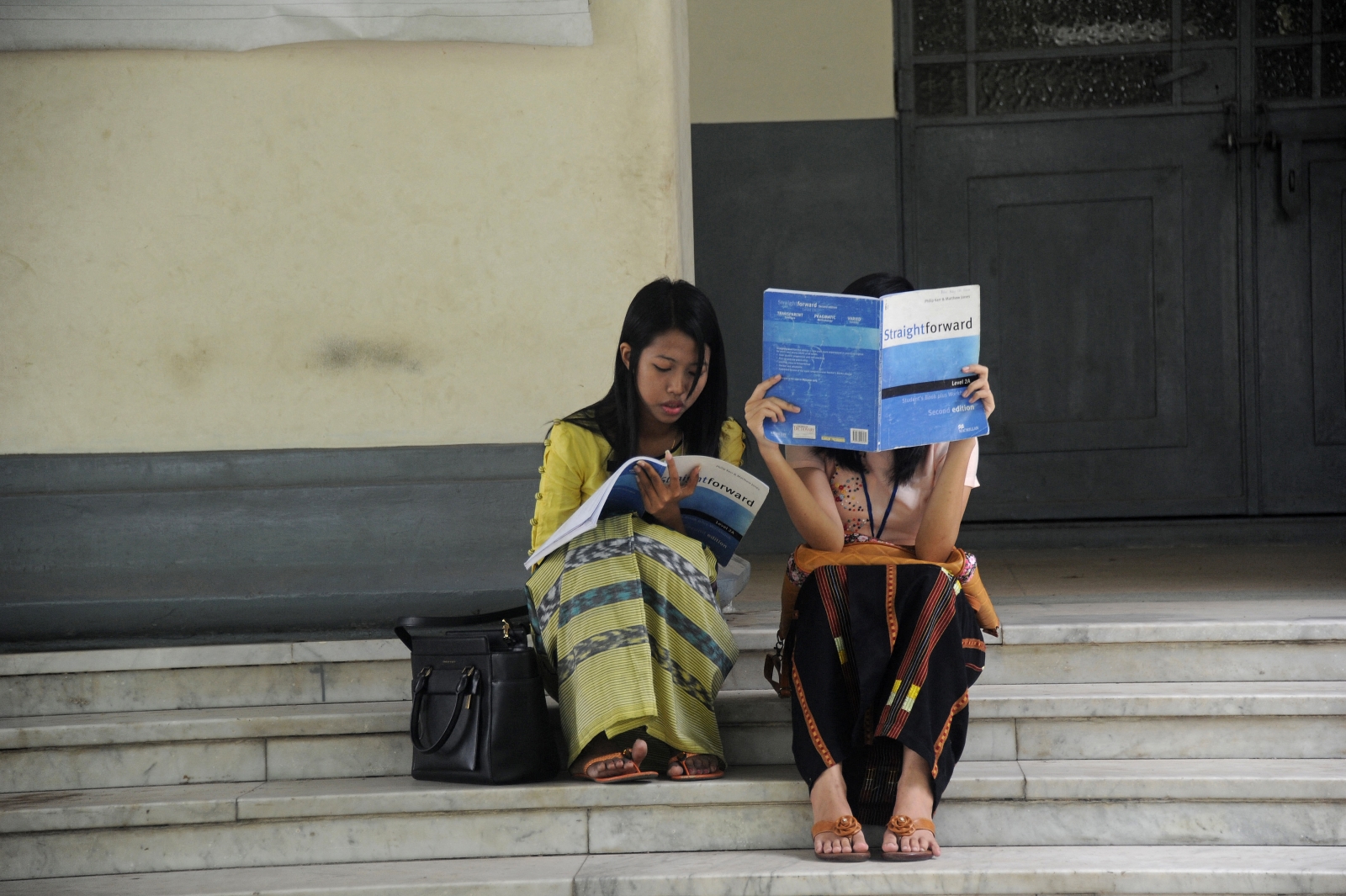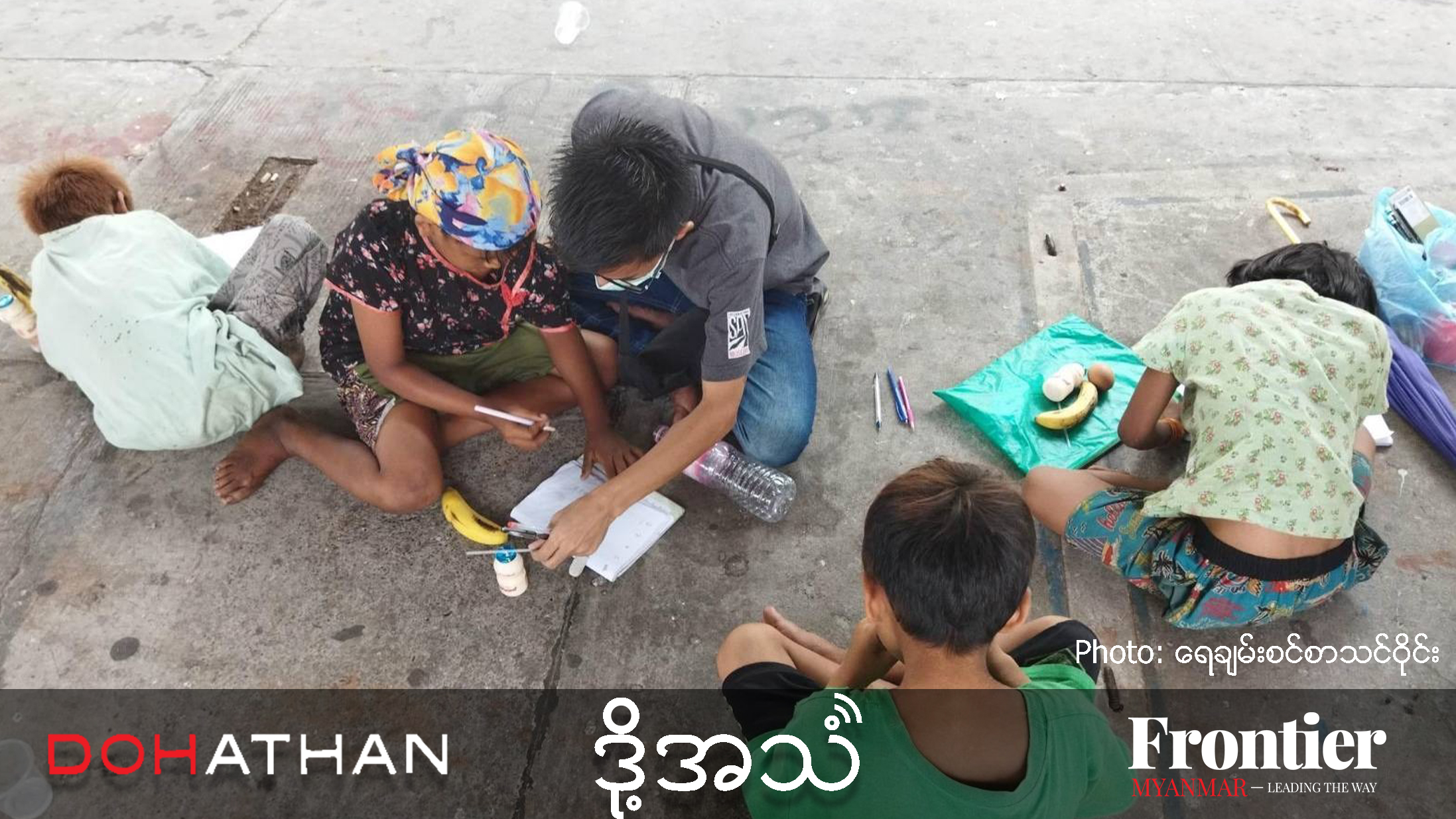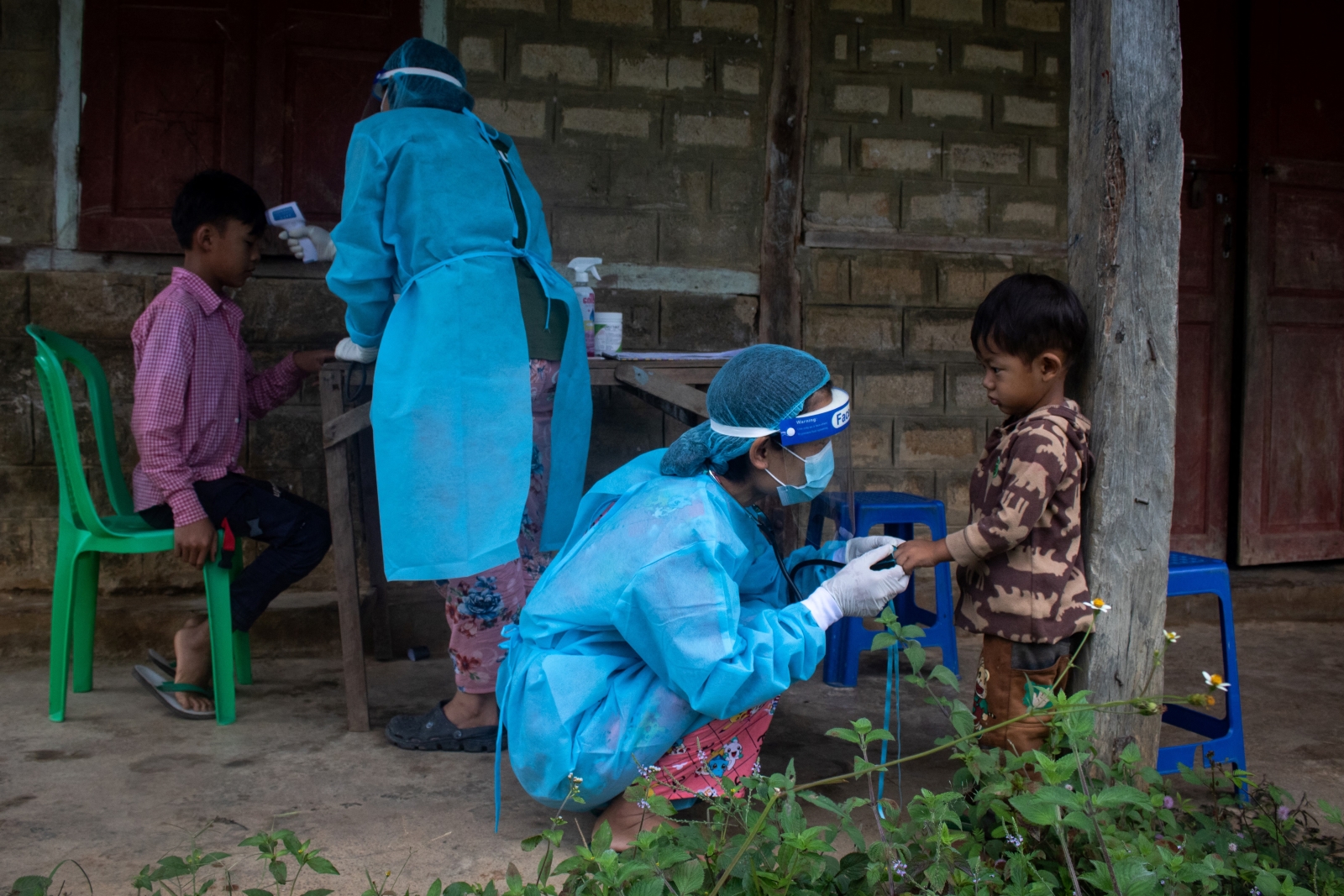After decades of rote learning, Myanmar’s education system is on the brink of a massive overhaul.
Tech entrepreneur Rita Nguyen’s new startup Jzoo doesn’t have a proper office yet, so the team, a handful of 20-somethings, set up their laptops on the kitchen table of her own downtown flat.
She picked them because they were clever, passionate about tech and had almost no experience in a company like Jzoo. Nguyen came to Myanmar after a career in silicon valley, but instead of searching for the Mark Zuckerbergs of Myanmar, she decided to make her own from scratch.
“I tend to hire the very young and the very inexperienced and train them. It’s the only way to go, honestly,” she said. “You don’t really go into a country like this and look for people who can innovate. You just don’t. That’s not to say they don’t exist, there’s just not that many.”
The innovation gap isn’t Myanmar exclusive. Nguyen’s native Vietnam and other Asian nations struggle to foster independent and creative workforces, yet as Myanmar emerges from decades of isolation, it finds itself decades behind. The government has begun a total overhaul of its education system to foster a deeper kind of learning, but the changes could take a generation to implement. Meanwhile, while new start-ups and foreign investors are coming in, and they’re looking for more than hardworking, cheap labour: They need people who can think.
“To be frank, students, not all, but many of the students cannot apply what they are taught to the real world,” said Dr Myo Win, interim chair of the Department of Methodology at the Yangon Institute of Education.
Support more independent journalism like this. Sign up to be a Frontier member.
Dr Myo Win argued that Myanmar society is weak in what he calls “higher-order thinking.” That concept—also called “critical thinking,” “social, emotional learning,” and a handful of other buzzterms—is tough to define in a textbook, however, in the real world, he claimed, the problem is clear: Myanmar people are less likely to take initiative and push boundaries, choosing instead to memorize, replicate, follow instructions and send any problems to the next one in charge.
He said the causes go to the very foundations of Myanmar tradition, which reveres elders and teachers and encourages perfection over experimentation—although British colonists didn’t exactly encourage independent thought, either. Perhaps most influential of all was decades of isolationist military rule, especially after the 1988 student uprising, which engineered a society based on codes, hierarchy and unquestionable authority, whether between commander and soldier or teacher and student.
“How do you foster risk-taking in children, these positive risks, sticking your hand up, coming up with an answer that’s not a memorization?” said Cliff Meyers, chief of education for UNICEF Myanmar. “How would you do that with your head teachers, so that they actually do something innovative or outside of the box? Because doing that comes with a huge risk. ‘Who said you could do that? Who gave you permission?’…That is part of critical thinking: willingness to look for opportunities and go for it.”
The most effective place to change a culture, he argued: Education.
“Ministries of education are pretty conservative, not only about transmitting information and knowledge. They transmit social norms. How you function as a society. The morals. The behaviour. All of that comes from the education system,” Meyers said.
The present government, at least, agrees. “They want their workforce to have employment skills. They want their kids to be able to graduate and be able to work, compete,” Meyers said.
But its current education system suffers from what Dr Myo Win calls “teacher-centred” learning. Think: huge classes, long lectures, few questions and no discussion between students. “Teachers are quite authoritarian,” Dr Myo Win explained. “Most of the students listen, note down. They do not think for themselves.”
Myanmar’s current ten-year basic education cycle culminates in a single national matriculation exam. Everything comes down to the exam, and the exam hinges on rote memorization.
“The exam is quite predictable,” said U Soe Win Than, a private tutor and instructor for the English Access Micro Scholarship Program, funded by the US State Department.
He said around exam time you can see students huddled over textbooks, muttering to themselves, learning equations, names and dates or English passages by heart. “It sounds like a parrot.”
When U Soe Win Than was in school, some of his teachers were passionate and invested; others, especially in high school, simply shuttled pupils through the system, delivering exactly what was necessary to pass. Even when the textbooks featured pre-reading and comprehension activities, the teachers rarely used them. “They don’t want to do that sort of thing because it is just wasting time when they know it won’t be on the exam.”
They aren’t necessarily lazy or unmotivated; they simply have no choice.
“In a large class, 60 to 70 students are in one room with one teacher. The teacher cannot handle it. The one teaching time period lasts 45 minutes. So during 45 minutes, what the teacher can do is write on the board, ‘Ok, copy now,” and walk out. If they don’t know, they have to take the private tuition,” he said, referring to the unlawful yet ubiquitous practice of giving private exam prep on the side for money.
American Jason Christofi trains aspiring English teachers an English Language Fellow at the Yangon University of Education. He said the memorization/recitation style of learning continues for his own students, one or two years away from becoming teachers themselves. Their curriculum, he said, is geared towards rehashing the data they learned in high school in order to accurately pass it on.
“When a parent passes a school and doesn’t hear students chanting in unison what the teacher has written on the board, they think, ‘What’s going on in there? They aren’t learning.’”
“I have copies of tests from precious terms that I didn’t make…What they do is take a selection of a reading, put it on the test, they remove some words, and you have to fill in where those words are missing. It’s just memory. These are teachers in training in their third and fourth year, and this is what they’re doing.”
He said his students are open and responsive to new methods and philosophies that encourage deeper understanding of material. “Outside of class when I ask, ‘What do you think about these activities?’ All of them will say something like, ‘Yeah, I really liked it. I think it’s wonderful. But I have to teach for the exam, so I don’t have time to do that.’”
The Ministry of Education is trying to change the narrative. In 2012 it launched its Comprehensive Education Sector Reform (CESR), partnering with UNICEF, JICA, the British Council and several other international organizations to totally reconstruct the education system.
The project will extend the education cycle to 12 years, replace its outdated curriculum and introduce more standardized tests that take more than memorization/recitation to pass. It has plans for reformed teacher training at the university level and will promote “child-centred” teaching methods that encourage discussion and independent thought.
“They are going to change the entire curriculum. Textbooks, learning outcomes, learning objectives, it’s a pretty big job,” Meyers explained. “They’re going to revise the whole shebang. They haven’t done that for 25 years.”
But even if the ideas are good, Meyers explained, implementing them is another problem entirely, one which has an entire deck of cultural, political and economic factors stacked against it.
Cycling new curriculum into the system one year at a time would take more than a decade, but a sudden change in the status quo would inevitably drop some students through the cracks. Furthermore, the Ministry of Education lacks people who can design modern curriculum, hence the dependence on international partners. On the economic side, there aren’t enough spaces in the higher education system, and exams that aren’t based on straightforward, pass/fail scores might seem less fair for students who are denied.
Most of all, Myanmar people simply aren’t used to anything else. Many educators will have to learn child-centred teaching methods without having experienced them themselves. Parents, too, will have to buy into the whole thing. “When a parent passes a school and doesn’t hear students chanting in unison what the teacher has written on the board, they think, ‘What’s going on in there? They aren’t learning,’” Meyers said.
But Meyers is optimistic. Formerly the regional education chief in Southeast Asia, he has seen similar attempts at reform wither, but he says beneath Myanmar’s decades of isolation and suppression lies a rich intellectual foundation.
“In Myanmar there’s a long history and a great tradition of self-reading and self learning and self-study,” he said. “Monasteries were used to teach reading and writing going back a thousand years, and progressive kingdoms incorporated that literary tradition. It has always been there.”
Even now, he continued: “There are learning materials and books for sale all over in markets. You go to Cambodia, you go to Laos, you go to rural Thailand, there’s nothing to read. So at least they are a lot more advanced in that.”
Rita Nguyen couldn’t wait for the system to catch up.
Before Jzoo, a cloud-based customer loyalty service for brick and mortar shops, she co-founded social media platform MySquar. Both projects required creative problem-solvers who also understood how Myanmar people think. Nguyen looked for them among the organizers of Myanmar’s wing of the grassroots tech conference BarCamp—they necessarily have corporate credentials (Nguyen’s current product manager at Jzoo was working in an internet café at the time) but initiative, passion and spunk.
Training her new recruits wasn’t easy. “I told them, go out and look at all of these things, and come back with a marketing plan. And they came back with ‘Well, we should do a commercial.’ Ok, why? ‘Well because commercials are good and people watch TV.’ And I’m like, ‘Ok, yeah, that’s not gonna work.’ So then you do the second round.”
But eventually her young team learned to recognize powerful ideas when they saw them and then refit them for Myanmar society. “There’s no reason why innovation has to be brand new,” she explained. “The critical thinking is not about being completely new, critical thinking is about understanding how to take and use ideas that work in Myanmar.”
Team members brainstorm and throw out ideas at weekly meetings, regardless of official duties, and the Jzoo office/apartment has no specific working hours and no vertical management structure other than a chief of staff to keep things coordinated.
“The first and foremost thing that I tell everyone on the team when they join, everyone on the team, is ‘We expect you to make mistakes. If you’re not making mistakes, then you’re not pushing yourself outside your comfort zone.’”
The idea is to make an environment where nobody can take shelter in the rules or authority—in other words, innovate or die. Most can’t handle it, Nguyen admits. She shoots down vast numbers of hopefuls for each new hire, and agrees with Dr Myo Win that widespread change could take a generation.
But Nguyen doesn’t care about Myanmar’s broken education system or history of oppression; what is important for her is the vast potential under this surface. She argues that to say that a changing Myanmar cannot think, explore and innovate right now: “That’s bullshit.”







